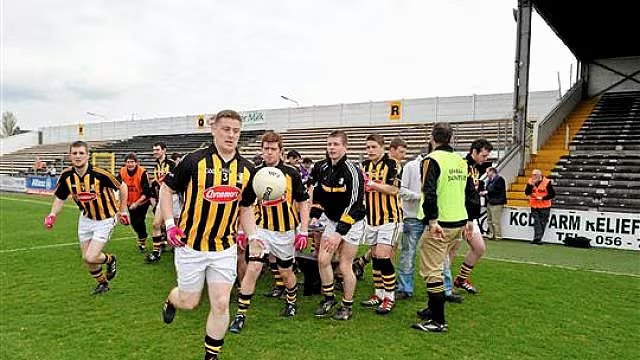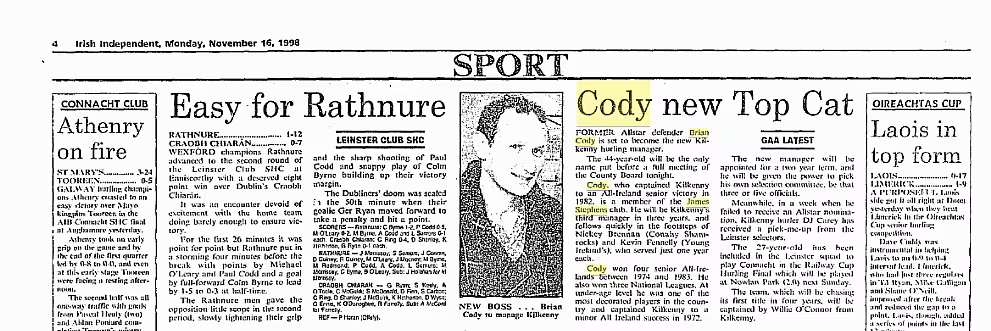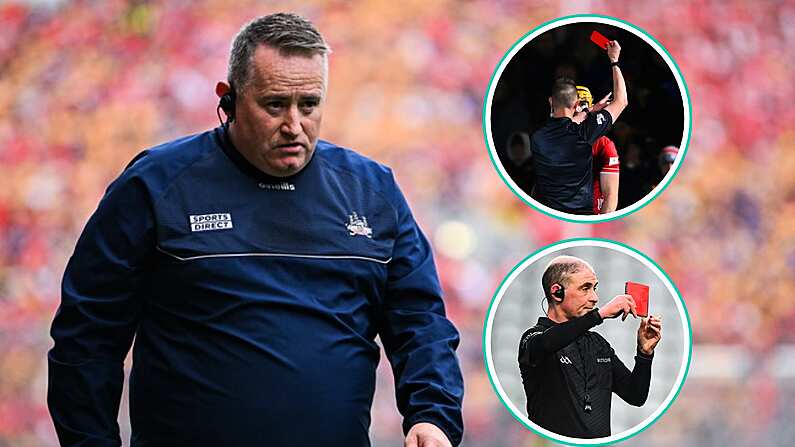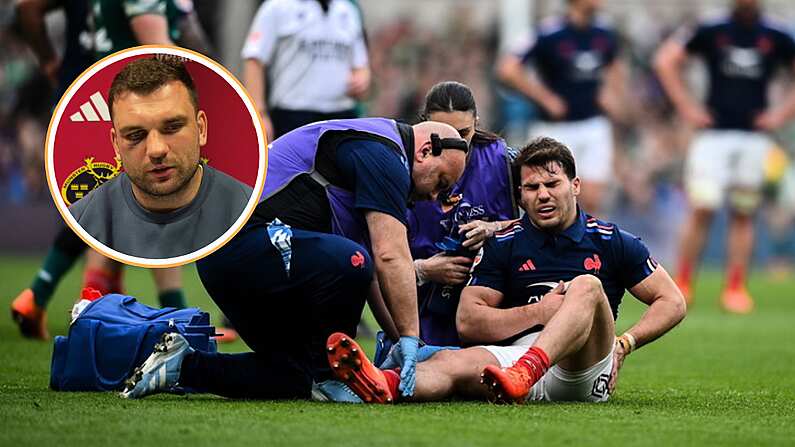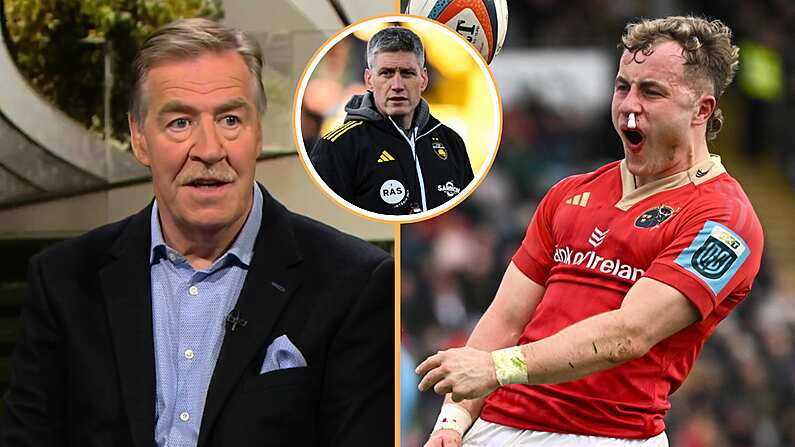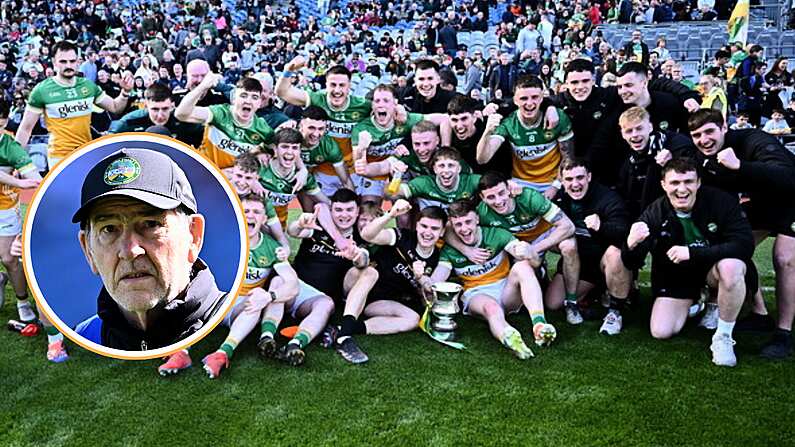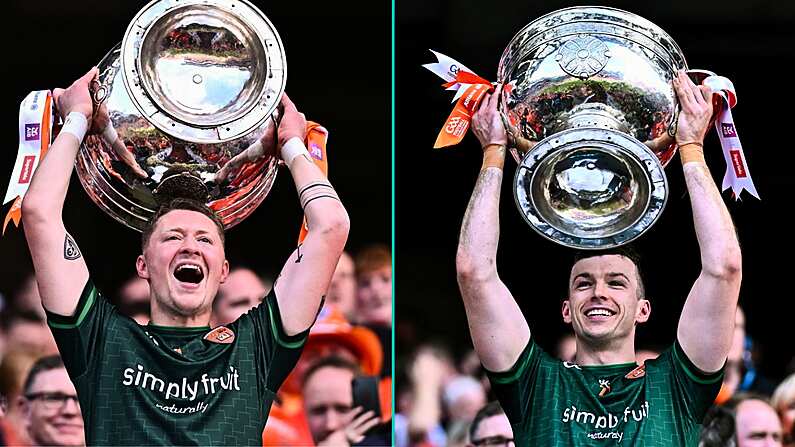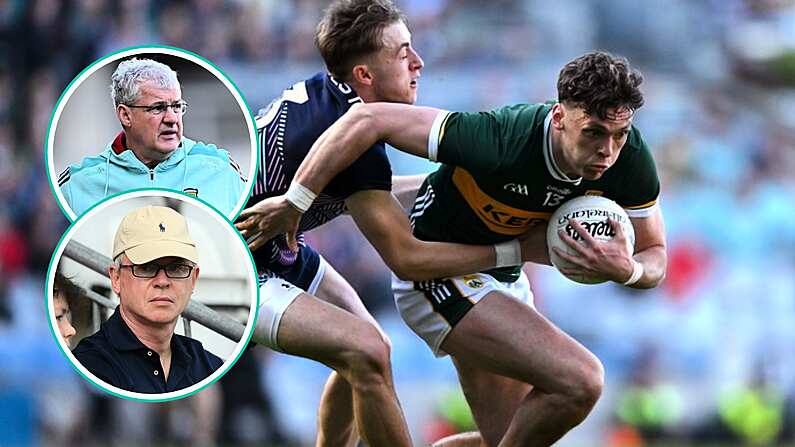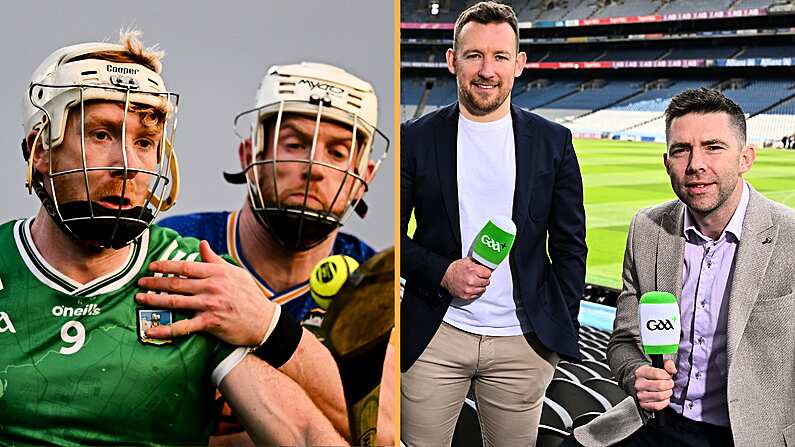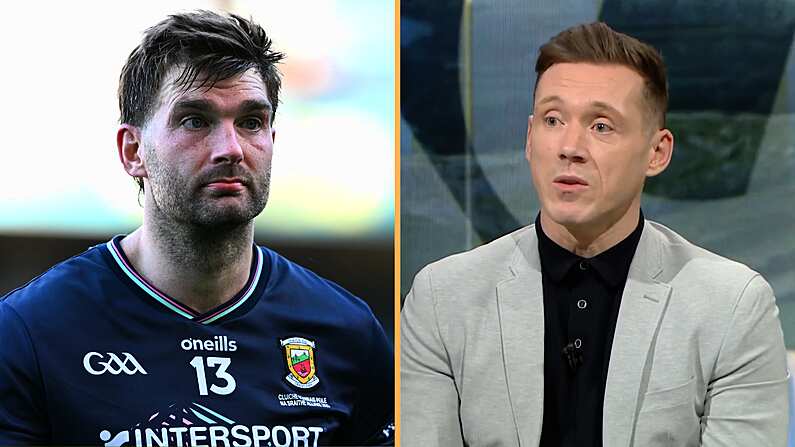Originally published, August 2016.
It's 17 June 1990. And while the rest of the country is exploding in anger at Eamon Dunphy flinging his pen across the RTÉ studio floor (a longstanding myth) and supposedly declaring that he was ashamed to be Irish (a stubbornly durable misquote), across town, in front of 17,000 die-hards, Kilkenny hurling is experiencing possibly its darkest day.
Offaly are the opponents in the Leinster semi-final. It's a fixture that tended to follow a different script in those days. For one thing, the preface to the 1990 chapter informed us that Offaly were chasing a third Leinster title in a row, so that's very different for a start.
DJ Carey, somewhat spooked by a selector who told him he wouldn't be long giving him the curly finger if he didn't deliver, endured a shockingly underwhelming debut.
20 minutes in, with Kilkenny losing 3-6 to 0-1, the selector was true to his word and DJ was whipped off. Incidentally, he had been responsible for the 0-1, albeit this he owed to his role as free-taker.
To his credit, rather than bolting from the stadium to check if the Egyptian defence had caved in yet, he sat among the subs and stewed about how things might have gone.
The selector in question will not, it is safe to assume, be collecting any lifetime achievement awards at the Sports Psychologists Annual Dinner Dance.
Things didn't improve massively with DJ sat on his backside. Or at least, they didn't actually win the remainder of the game. The match finished up - Offaly 4-15 Kilkenny 1-8.
LEAN PERIOD - BY THEIR STANDARDS
Notwithstanding the fact that the 80s and 90s is regarded as a relatively lean era in Kilkenny, they still plundered four All-Irelands across the two decades.
In fact, they won as many All-Irelands as any other county in that period. In a grand democratic era for hurling, four All-Irelands was as much as anyone else accumulated. Offaly hurling revelled in a golden era. They managed four All-Irelands. Cork dipped in and out of prominence. They only won four. Galway experienced their greatest era in the 1980s, winning three. Tipp and Clare won two each and Wexford managed one.
The feast they enjoyed in the noughties - and the last decade - made the 80s and 90s look like very thin gruel indeed.
The era was pockmarked with two real lows, namely, at the end of 1980s and the middle of the 1990s. They reached the 1987 All-Ireland final but only rustled up 0-9 on a wet day.
Thereafter, Offaly retook control of the baton in Leinster. Perhaps as an illustration of how far Kilkenny had sunk, the Offaly team who won three Leinsters in a row from 1988 and 1990 didn't even reach an All-Ireland final, losing one semi-final to Antrim.
Carey was the poster child for the emergent Kilkenny generation of the early 1990s. They reclaimed Leinster in 1991 but proceeded to very nearly lose to Antrim in the All-Ireland semi-final. An experienced Tipp team hitting their peak had too much in the All-Ireland final.
Kilkenny returned the following year and pulled off a moderate surprise to beat Cork in the All-Ireland final. After nine years, it ended their longest 'famine' since 1947-57.
After beating Galway in the 1993 decider, it was serenely assumed that the team had the stuff to go on winning regularly.
In fact, Kilkenny experienced a short but rather jarring dip in fortunes. Along with Cork, they were primary victims of hurling's revolution years. During the middle of the 1990s, they fumbled around uncertainly like a deposed monarch living in exile.
Their fortunes bottomed out in 1995 when they squeezed by Laois by two points in Carlow only to be served with a hammering from Offaly in the Leinster final.
2-16 to 2-5 was the eye-watering full-time score, and but for a couple of late DJ Carey goals it would have looked substantially worse.
In 1998, they won their first Leinster title in a scarcely believable five years. It was won with little swagger. The Offaly players weren't hitting it off with their manager. While there is some dispute over who pulled the trigger, Babs' removal followed shortly afterwards. They emerged from the turmoil a liberated team under a manager who freed them to play as they wished. They turned over a pale Kilkenny in the All-Ireland final.
"KILKENNY HAS ALWAYS BEEN REARED ON HURLING SUCCESS - TOO MUCH MAYBE..."
After just the one year in charge, Kevin Fennelly decided to step down, a move regarded at the time as abrupt. It looks even more so now. In the immediate aftermath Noel Skehan was moved to rule himself out of the succession race. So too did managerial royalty Diarmuid Healy. Other candidates whose names were dropped in the papers included former Waterford manager George Leahy and Richie Power.
By November, however, Brian Cody's was the only name left in the race. His appointment was given a couple of columns in the national papers, who noted that he was "the only name to be put before the county board."
YouTube used to house a video of the Kilkenny 2009 homecoming. Hurler of the Year-elect Tommy Walsh takes the mic and gives a shout-out to the people "from the sout'" in a top-notch impression of Willie O'Connor, Cody's captain when he won his first All-Ireland with Kilkenny. (O'Connor's voice is so south Kilkenny that it almost sounds Waterford).
D'you know Cody said to us? Cody didn't talk about winning an All-Ireland. You know what he said? Ah Jaysus...(deliberately indistinct and excitable muttering from Tommy still in character + crowd laughter) He said "We will create a spirit that will never be broken!"
It's a stirring line and makes Cody comes across shaman-like and inspired in retrospect. The story is soured by the fact that Cody didn't actually say it. Or at least that's not where Walsh got the line. He told Kieran Cunningham that he found the line reading Val Dorgan's biography of Christy Ring.
No, Cody's beginnings in the job seem a bit more humdrum than that.
Cody had no trouble confessing to an interviewer a decade later that he hadn't set the world alight when looking after teams prior to his getting the Kilkenny job. The presumption was they were getting a steady hand at the tiller rather than a maverick. No doubt, some regarded the appointment as "unimaginative".
He managed James Stephens to the county final in 1996, but they were beaten after a replay by a DJ Carey-inspired Gowran. They wouldn't win a county title while he was involved with the senior team.
Eddie Brennan, not yet a Kilkenny senior but soon, remembers the response to his elevation to the senior job being slightly underwhelmed.
He was manager of James Stephens around 1996. In that regard, when he did come along and get the Kilkenny job, I just remember people commenting at the time that he hadn't really been in charge of many teams up to that point.
I just know that at the time that it was kind of... not so much that it was an unusual appointment but it was an appointment made without him having set the world alight in other ways.
I suppose that was based on James Stephens. They were so close to winning that county final in '96 and a certain DJ and Charlie, in a replay, done a number on them. I remember playing in a minor final that day myself and looking on at it afterwards and enjoying it.
The only experience I had with Brian Cody up to that point was primary school because he was involved with De La Salle and they were pretty strong. He was just... it's amazing, he has not changed a bit. He's the same Brian Cody now as he was back then. He has the same appearance. He hasn't changed a day. What struck me about him was that he had such a presence about him, physically as much as anything else.
At the time I wouldn't have known a whole lot apart from my uncles and fathers maybe talking about Brian Cody. I knew he played for Kilkenny and apparently [was] a good player
The week of his appointment, he gave an interview to Diarmuid O'Flynn, hurling writer in the Irish Examiner (and future 'Ballyhea Says No' founder and election candidate for the European Parliament).
In the interview, Cody made strenuous efforts to dampen down expectations. Hurling, he pointed out, had become "much more open" in recent years and Kilkenny supporters who were reared on success had yet to modify their expectations in line with "this new reality". Kilkenny fans, this implied, would have to get used to the idea of other counties winning as much as them.
"It's a fierce challenge," said Cody.
"I know it is. Kilkenny has been reared on hurling success - too much maybe - and the expectations are always high. Lately the game has become much more open, with a lot of new teams coming through.
"Wexford were always a challenge of course but now you have Offaly also in Leinster, with Laois threatening to make a breakthrough. And while Dublin got badly beaten this year, they are still a fine side, with good young players coming through.
"You then have Clare, Waterford, Galway, all capable of winning All-Ireland's. However the fans don't seem to have adjusted that new reality yet so the expectations are still high."
There was little suggestion that he was about to make the competition at the highest level far less open. The new reality that Cody was about to unleash would not require that Kilkenny supporters quell their expectations.
"MARKING PETER BARRY... IT WAS EASIER GOING INTO A CAGE WITH A BEAR"
Cody's first season in charge went fairly swimmingly until September. They won Leinster much handier than they had the previous year.
With DJ on fire, they downed the feared Clare beast in the All-Ireland semi-final, arguably Kilkenny's most significant championship scalp since they'd last won the All-Ireland. The weather wrecked the final but Kilkenny appeared to have done enough with 10 minutes left. But Cork's young guns popped over points and the game was snatched away.
His post-match comments were blunt. There was "no guarantee" that Kilkenny would be back next year.
Eddie Brennan arrived into the Kilkenny panel two months later in November 1999. He found a panel where the hunger had reached starvation levels.
"In 2000, what struck me was the absolute viciousness of training," says Brennan.
"I mean that in a good sense. He was just so driven. And the players themselves too. I remember having to mark Willie O'Connor and Philly Larkin and those guys and they'd just go through you to get the ball. Things had cranked up a fair bit.
"To me, it was outside anything that I'd ever imagined that inter-county hurling was. The physicality of it. Marking Willie O'Connor one night. He'd just eat you alive. It just survival really, even though you were still starstruck by all these guys. It was just raw determination because the players themselves were quite cut over that (losing two in a row)."
During his own heyday, Ger Loughnane liked to be seen to be engaging in masterful managerial tricks of the mind and coming up with dazzling, innovative, left-field theories. His managerial philosophy he wrote in his book, was partly inspired by an article in the April 1997 edition of the MIT produced 'Sloan Management Review', not a periodical habitually referenced by hurling managers.
The crucial passage read: "By breaking the rules of the game and thinking of new ways to compete, a company can strategically redefine its business and catch its bigger competitors off guard. The trick is not to play the game better than the competition but to develop and play an altogether different game."
Being placed in charge of one of those bigger competitors, Brian Cody didn't have to lean on the wisdom imparted in the Sloan Management Review.
In contrast, Cody works hard in interviews to de-mystify his success. He always passes up the chance to even imply that his sideline genius is an indispensable factor in anything. To the point where it the whole thing has become fairly comical. Hurling is hurling is hurling. First to the ball. Do the simple things well. We don't do tactics, whatever they are.
As long as you have with you the trusty companions of savage genuineness and honesty, they'll see you all-right. Indeed, he has remained so on-message about this that people increasingly believe there must be more to it.
Brennan is continually quizzed by outsiders, pleading that he let slip what is this special ingredient Kilkenny are using.
I've often got this when I go to places maybe doing a medals presentation and you meet people around and they're so inquisitive to know what you're doing different on the training ground.
But there's just an absolute focus on doing the basics right. Even first touch and how to get your touch as good as it can be. The reality is, it's the simple stuff done well and the simple stuff done better than everyone else. That was to the forefront of it. There's no magical coaching going on. There was no one-on-one sessions. I mean, don't get me wrong, at times, he would pull you to one side and give you a few pointers.
But also, he knew he had winners in there. With the likes of DJ, Charlie and Peter Barry. It was a bit like the old bull and the young bull.
You're looking at what DJ was doing in matches as we had been for years. And then you'd see him up close in training and you'd see that DJ wasn't afraid to get the hands dirty, as in hooking and blocking. And in a way it was monkey-see, monkey-do. You saw what the top quality players for what he was willing to do.
Like, marking Peter Barry in training, it was probably easier going into a cage with a bear - and I mean that in the height of respect. You just earned your ball on Peter Barry and I suppose it just created that competitive environment on the training field.
Their closest game in the 2000 championship was their eight point win over Galway in the All-Ireland semi-final. Everyone else who stepped in front of the juggernaut was knocked clean out of the way.
DJ Carey was especially majestic in the final, the forum in which he thus far largely failed to deliver. Even in 1993, when he won Hurler of the Year, he was shackled in the final by Man of the Match Padraig Kelly.
Offaly had tormented them over the years. With a bank of major victories there, they lost nothing to Kilkenny in the mental department. But their bodies were creaking badly. They found they couldn't live with the machine that Cody had been fine-tuning in 1999 and 2000. Offaly dropped off the radar very quickly afterwards.
The manner of the victory suggested that it was going to be far from a once off. When Clare or Wexford won their All-Ireland titles in 1995 and 1996, the feeling was they'd expended themselves in the effort to reach the summit. They'd be content to enjoy the view (Clare, in a tribute to their manager's ambition, transcended that by winning again two years later). But with Kilkenny in 2000, it very quickly it became apparent that they had the potential to dominate.
"WE JUST COULDN'T IMAGINE ANYONE ELSE"
In the 11 All-Ireland final victories of Cody's reign, Kilkenny have met and dispatched almost every serious hurling county.
To neutrals, their success started getting old. Prior to the past five years, Kilkenny success settled into being a fact of life. "Death, Taxes, and Kilkenny," was the rueful sigh of rival fans and variety-seeking 'neutrals' after every big win.
The 2015 All-Ireland final probably marked the apogee in this regard.
It was perhaps the most pared down, routine, no-frills All-Ireland Kilkenny have won to date. It provoked an even greater howl of despair than normal among rivals and those itching for change.
Waterford Whispers released a video parodying those "mental fan reaction videos" of a Kilkenny man reacting to his team winning an All-Ireland. Richie Hogan admitted on Second Captains that he wholly understood why many people now wanted to see Kilkenny lose.
Leaving Croke Park at the end of the 2015 All-Ireland final, one middle aged Kilkenny supporter was heard greeting another, much more elderly, Kilkenny supporter, with a sigh of "well Ned, another one chalked off!"
Pundits consistently argued that the current Kilkenny crop weren't in the same class as the team of the late noughties. For a time, Loughnane was hinting at their imminent dethronement nearly every year.
In that sense, it's reminiscent of the twilight years of Alex Ferguson's reign, when it was suspected that it was the manager's very presence that was, at that stage, single-handedly powering much of the success (a theory vindicated by what happened after his retirement). The Ferguson comparison interests Brennan.
I've just finished reading Ferguson's book on leadership. And I just see so many, so many parallels to what their philosophy would be, on the type of player they'd want especially.
Ferguson was very interested in players' backgrounds, and looking at players that had resilience and worked hard for what they got.
The vast majority of Brian Cody's players were certainly fellas who weren't afraid to roll up their sleeves and get stuck in. A view he would hold is that any player worth his salt in Kilkenny, or anywhere for that matter, can be given the ball on their own and put it over from 40 yards out and could make the ball talk, but he wanted fellas who could perform under pressure when there was two or three lads bearing down on you.
In Brian Cody's second year in the job, they were terrified they were going to complete "the dreaded three-in-a-row" of All-Ireland losses.
Looking back, did anyone have any inkling of what was coming down the tracks?
"When people assess a manager, they tend to look at the previous `0 years and say, "what has he done as a manager?" And they base it on that," Brennan says.
"And I've no doubt that there were certain quarters in Kilkenny that were suspicious of the appointment. And probably felt that it wasn't going to be better than the way things were. We were coming off a lean period and some people might felt, 'well, jaysus, we don't know if this was the man.'
"But certainly, not too many envisaged what he was going to go on to do. And even us (the players) as time went on... because I know in 2005 (after semi-final loss to Galway), the pressure came on him.
"But as time wore on then, I remember commenting to Derek Lyng when we were playing that we just couldn't imagine anyone else coming in and being charge of that dressing room. I just couldn't imagine another manager. And it was almost just no, 'he's just the manager and that's it' (laughs). He's the Kilkenny senior manager and that's it."
See Also: 'It's Not Wrestling A Lion': David Herity On Playing Senior Football For Kilkenny
